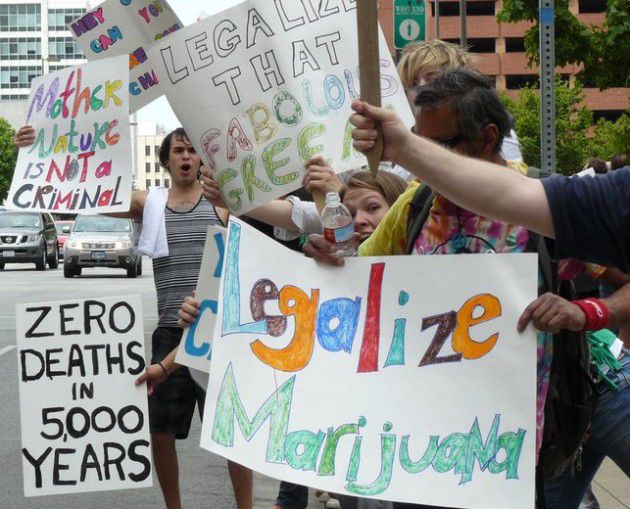Modern recreational drug culture is dangerous
April 18, 2016
As a nursing student, I believe that all medication has a therapeutic purpose that must be held sacred. I believe that medicine must aim to heal those who clinically need it, from the chemotherapy a cancer patient receives to the medicinal marijuana that chemo patient is prescribed to relieve the consequent pain, extreme nausea or vomiting, and loss of appetite, among other trying side effects. Medicine has a purpose, and its effects should be harnessed to promote recovery and comfort in the battle against illness or death—so, I am partial to the conviction that recreation is simply not a good enough reason for the use of those drugs.
I have a problem with legitimizing the risk of more easily misusing a substance that profoundly alters the body’s neurochemical physiology and behavior. Due to the relevancy of its legalization and its status as the most common street drug, marijuana is the object of much attention. Many argue for legalization of its recreational use on the bases of individual freedom and short-term effects. However, the argument of individual freedom can be disproven: in order to participate in a peacefully operating society, there is a need to limit individual freedom so that individuals are not free to murder, steal, cheat or act under the influence. More importantly, the short-term benefits of marijuana are made questionable by the unknown long-term effects of regular use.
Research suggests that the legalization of recreational marijuana must be approached with caution. Among the biggest concerns of researchers is that even “harmless” drugs such as marijuana can significantly hinder the normal, healthy development of adolescent brains. Because more accessibility and more prevalence means that the substance can more easily fall into the hands of minors for recreational use, it appears that this should be a concern. A study conducted by researchers at Duke University on New Zealanders has shown that those who consumed weed as teenagers and continued frequent use showed a drop of about 8 IQ points, which suggests further need for consideration about marijuana’s overall effects on intelligence.
In addition, since the high resulting from marijuana comes from the altered activity of neurotransmitters and receptors in the brain, this changed state also impairs cognitive functions, specifically attention and memory. Other mental and motor abilities also suffer negative impacts with regular marijuana use, such as reaction time, which slows remarkably in an individual under its influence.
Proponents of recreational marijuana use may argue that these effects are innocuous in instances of getting high at home or in a stationary fashion. However, the threat to the user and to others increases dramatically in cases pertaining to being high on the highway. Research shows that drivers under the influence of marijuana are notably slower in braking their vehicles and experience impaired depth perception. Although the legal use of marijuana is conditional on the amount consumption (i.e., only a certain amount is legal), a problem emerges for law enforcers since the drug levels in the body cannot be checked noninvasively, as alcohol can with a breathalyzer test. For police officers to accurately check the concentration of a drug present in the blood, a warrant for a blood test is required.
As any student knows, the dose makes the poison, which in this case indicates that it does not matter whether a “safe” amount of a drug is legalized if there is no way to monitor amounts of consumption in those who abuse it and exceed those limits. What good is a law that cannot be enforced?
Further reasons for concern are presented in that legalization will catalyze the already dangerously looming threat of more potently cultivated cannabis. This means intensified effects of a drug whose long-term implications we still do not understand.
Some believe that legalization will benefit the economy by raising state revenue. However, this takes matters at a surface level that discounts more significant risks. The black market for street drugs and marijuana specifically would still exist, despite legalization, and the competition resulting from legal vendors added to the pre-existing black market competition would increase the chance that these drugs, which are sold by weight, will be contaminated. Street drugs already contain contaminants, such as sand or glass, that are added to the drug as a means to maximize profitability, albeit corruptly. Long-term effects of smoking or otherwise consuming such contaminants include inflammation and scarring of lung tissue. So, if the drug itself isn’t causing explicitly manifesting problems, the contaminants will. And if street drug dealers of the black market are already resorting to contamination, what will the competition resulting from legalized drugs bring about?
In addition to the medical, legal enforcement and economic implications of the legalization of recreational marijuana, legalization of one drug will contribute to a lax policy and attitude toward overall drug use, enabling that drug to be a gateway, not only for individual users but also for those who witness a law that varies among states and depends on legal conditions that cannot be enforced. An overall blurred line will be the inevitable result of legalizing one drug and becoming “open-minded” about another, particularly if the legal uses of different drugs vary across different states in the country. If a law is perceived as full of loopholes or seems to present opportunities for subjective interpretation or is not strictly enforced, this lax attitude will be the consequence.
I encourage everyone to take a stance on this issue and form an ethical perspective on the legalization of recreational marijuana—but first and foremost, understand what the term recreational means and what you are willing to pay—beyond just money—for a good time.


